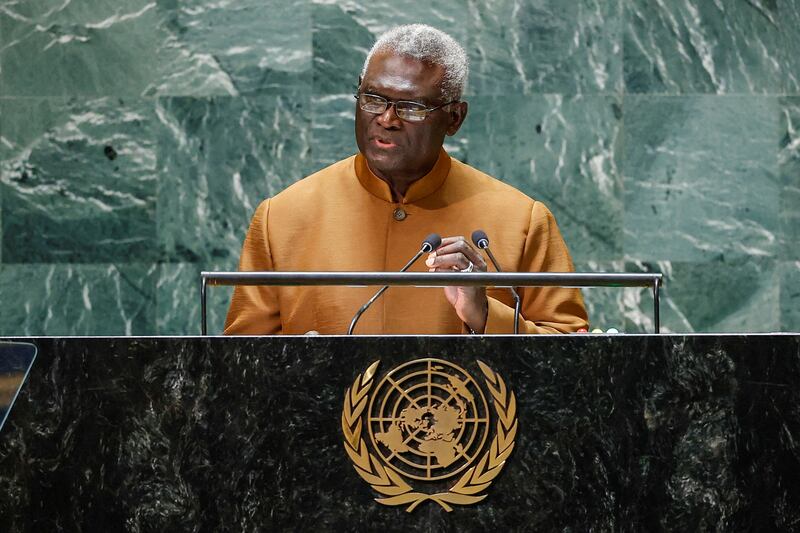Pacific island nations have been skeptical about the recent revival in U.S. interest in the region. Despite those misgivings it’s likely that Washington is back for the long haul.
China’s rise to a major economy – second only to the United States – is reshaping the world, notwithstanding its current domestic economic problems. So is its military buildup. U.S.-China competition is now embedded in geopolitics.
American officials have been at pains to stress historical ties to the Pacific and involvement in the region long before China’s government appeared on the scene, as a way of refuting the narrative that Washington’s primary motivation is to counter Beijing.
Indeed U.S rhetoric asserts that its renewed attention to Pacific island countries is everything but a response to China. Instead, we’re told it’s the continuation of long-standing ties, grounded in shared values such as democratic governance and the international rules-based order.
"Like our forebears during World War II, we know that a great deal of the history of our world will be written across the Pacific over the coming years," President Joe Biden said last month at the second summit in Washington of U.S. and Pacific island leaders in a year.
The awkward fact is that the United States did pack up and leave after the Cold War, when the Pacific was no longer deemed strategically important, assigning to Australia the role of deputy sheriff. The void was filled by China, which has become entrenched in the region through its diplomatic, economic and, increasingly, security ties with island countries.
The Pacific has gone from strategic neglect just a decade ago to the focus of strategic interest, competition and manipulation today, Pacific Islands Forum secretary-general Henry Puna said on the eve of the Washington summit.
Puna also cautioned that the strategic attention would not last forever as he urged Pacific island nations to “capitalize on it” to ensure sustainable gains for decades to come.
While nothing is forever, it is likely that this time the United States and its allies are in the Pacific as part of a long game with China. Working as strenuously as they are to regain their vantage point in the region, it is unlikely that these allies will relinquish any upper hand to China.
The United States-Pacific islands summits are just one component of a massive effort to counter China’s influence and shore up strategic interests in the region. A third leaders’ summit was confirmed for 2025 and biennial political engagements to follow thereafter.

China-friendly leaders such as Solomon Islands Prime Minister Manasseh Sogavare and Kiribati President Taneti Maamau have insisted that China’s interest in the Pacific is purely economic, and dismiss claims of militaristic designs. Both countries switched their diplomatic recognition to Beijing from Taiwan in 2019.
The United States, meanwhile, is clearly concerned that Beijing seeks a permanent military presence to project power in the region, including by being within striking distance of its ally Australia.
These developments are reflected in a marked increase in military investments in the Pacific, including the signing of defense treaties and more training for the region's security forces.
Many analysts believe that because of China’s growing assertiveness and ambition, the U.S. expects and is preparing for a possible showdown.
Possible flashpoints are Taiwan, which Beijing regards as a rebel province that must be reunited with the mainland, and China’s claim to the entirety of the South China Sea, which puts it at frequent loggerheads with Southeast Asian nations.
Biden’s recall of the Pacific War in his summit address had a sentimental element but it also perhaps unwittingly reminded his audience of the risks of conflict in the future.
Pacific nations are adamantly against any escalation of tensions in the region, as reflected in Fijian Prime Minister Sitiveni Rabuka’s call for the Pacific to be a “zone of peace.”
But the hard reality is that just as in World War II, the Pacific’s influence in the big-power contest is limited.
When it comes down to it, the superpowers are more likely to do what they see fit to protect and advance their own interests than not.
Shailendra Bahadur Singh is an associate professor and head of the journalism program at The University of the South Pacific in Fiji. He has written widely on Pacific media, politics and development. The views in this article are his own and do not reflect the position of The University of the South Pacific or BenarNews.
